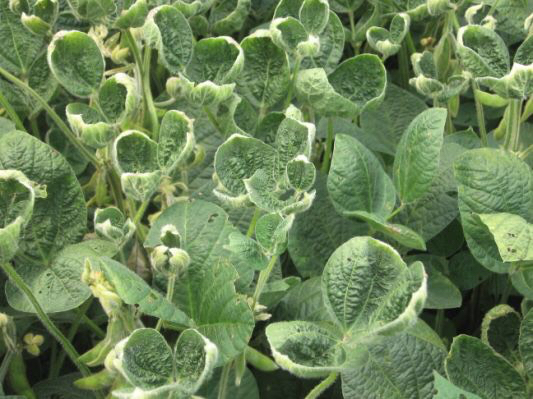Ark. State Plant Board approves emergency rule to ban use, sale of dicamba herbicides
June 23, 2017
By Mary Hightower
U of A System Division of Agriculture
Fast Facts:
- Arkansas State Plant Board approves emergency rule to ban use, sale of dicamba
- Governor must review changes, refer to legislative council subcommittee
- Hay and forage growers exempt from emergency ruling
(290 words)
(Newsrooms: with file art: www.flickr.com/photos/uacescomm/28292584046 )
Ark. State Plant Board approves emergency rule to ban use, sale of dicamba herbicides
LITTLE ROCK – The Arkansas State Plant Board voted Friday for an emergency rule banning sale and use of dicamba at a time the board’s pesticide division saw the number of complaints alleging dicamba injury to non-target crops grow to more than 240.

The State Plant Board’s action also seeks to speed implementation of enhanced penalties for misuse, with fines up to $25,000 for each infraction. The emergency rule exempts pastureland from the dicamba-use ban.
Engenia is the only dicamba herbicide permitted in Arkansas for use with row crop production past April 15 and it can be used with dicamba tolerant crops. Soybeans without the tolerance, peanuts and some fruit and garden crops are highly sensitive to dicamba.
The emergency rule goes next to Gov. Hutchinson for review, who would then refer it to the executive subcommittee of the Arkansas Legislative Council. If the rule passes muster with the governor and legislators, it would take effect upon being filed with the secretary of state’s office. It would be in effect for 120 days.
Until the emergency rule goes into effect, Engenia may still be used.
Before voting, the board heard an update from Susie Nichols, director of the State Plant Board’s pesticide division, noting on Friday there were 247 complaints alleging dicamba misuse, she said, adding that on June 11, the board had received 27 complaints. The following week, the number of complaints stood at 62 and by June 21, there were 153 complaints.
The complaints covered 19 counties: Ashley, Chicot, Clay, Craighead, Crittenden, Cross, Desha, Greene, Jackson, Jefferson, Lee, Little River, Mississippi, Monroe, Phillips, Poinsett, St. Francis, White and Woodruff. According to the plant board’s website, Mississippi County had the highest number of complaints at 81, Craighead had 34 and Crittenden 32.
(See: Background on dicamba https://www.uaex.uada.edu/media-resources/news/november2016/11-21-2016-Ark-Dicamba-Primer.aspx)
The Arkansas State Plant Board’s dicamba updates page is here: http://www.aad.arkansas.gov/arkansas-dicamba-information-updates.
About the Division of Agriculture
The University of Arkansas System Division of Agriculture’s mission is to strengthen agriculture, communities, and families by connecting trusted research to the adoption of best practices. Through the Agricultural Experiment Station and the Cooperative Extension Service, the Division of Agriculture conducts research and extension work within the nation’s historic land grant education system.
Pursuant to 7 CFR § 15.3, the University of Arkansas System Division of Agriculture offers all its Extension and Research programs and services (including employment) without regard to race, color, sex, national origin, religion, age, disability, marital or veteran status, genetic information, sexual preference, pregnancy or any other legally protected status, and is an equal opportunity institution.
# # #
Media Contact: Mary Hightower
Dir. of Communication Services
U of A System Division of Agriculture
Cooperative Extension Service
(501) 671-2126
mhightower@uada.edu
Related Links